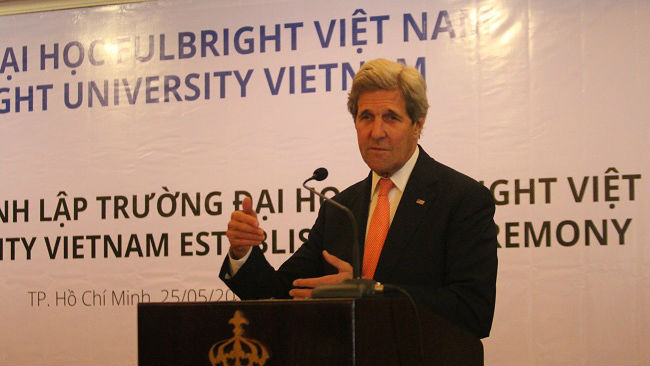Vietnam turns semiconductor vision into action
The global semiconductor industry is being reshaped by geopolitical tensions, shifting supply chains, and the surge of digital technologies.




It is possible that Vietnam will someday have something comparable to Yale-NUS University in Singapore, which has extremely competitive admissions standards and around 40% of enrolled students from abroad.

The World Economic Forum categorizes economies into three stages of development for its annual Global Competitiveness Index. In East Asia, economies like Cambodia are still in the “factor-driven” stage (stage one); while more developed emerging markets like Thailand are “efficiency-driven” (stage two). At the top, a handful of Asian economies such as Japan are in the “innovation-driven” stage (stage three), alongside economies from North America and Western Europe.
In qualitative terms, stage one economies are still trying to establish a decent foundation for development, and remain dependent on cheap labor and natural resources to generate growth. But when economies graduate to stage two, higher wages oblige them to increase productivity to remain competitive.
In 2015, the World Economic Forum elevated Vietnam from stage one to a “transition” group that is in the process graduating to stage two (the Philippines is also in this group). This symbolic change in status is a sign of Vietnam’s strong economic growth in past thirty years. However, it also points to a challenging road ahead.
To continue its economic advance and avoid the “middle-income trap,” Vietnam will likely need to address certain shortcomings that could impede its ability to move up the value chain. According to the World Economic Forum, one such deficiency is the standard of higher education and training in the country.
Although Vietnam has been praised for its relatively strong basic schooling, the development of universities, colleges, and vocational programs has lagged behind. According to the Competitiveness Index, an “inadequately educated workforce” was cited as the second biggest problem for doing business in Vietnam (behind only “inadequate access to finance,” and above “corruption,” “inadequate infrastructure” and other problems). In its 2017 rankings of higher education systems, the World Economic Forum ranked Vietnam 84th, well behind Thailand (57th) and the Philippines (55th).
In recent years, there has been considerable chatter about foreign universities that are already established in Vietnam or are in the planning stages (including RMIT, British University of Vietnam and Fulbright Vietnam). Can these universities help Vietnam narrow the higher education gap with neighboring countries?
Before answering, it is important to consider the main mission of these universities. Are they going to educate a large number of students at a cost that is relatively accessible to ordinary people? (This is the function of most public universities and colleges around the world.) Or are they intended to train and develop a small number of elite students with the hope these graduates can make big contributions to the country as entrepreneurs, scientists, civil servants and so on? (This is the role of Harvard, Oxford, University of Tokyo, and other schools considered to be in the global elite.)
My friend Julio Giulietti, who heads a Georgetown University (US) program in Ho Chi Minh City, is somewhat skeptical that foreign universities in Vietnam can fulfill either of these roles effectively.
Mr. Giuletti says building a full-scale international university “from the ground” up is very difficult, and requires a lot of investment in physical infrastructure, and especially in human resources (foreign PhDs don't come cheaply!). These costs add up, and to make foreign universities financially viable; they need to charge tuition fees that are far more than what most Vietnamese students can afford. Furthermore, among students who have the higher financial capability and strong academic credentials, a university in Vietnam is not going to enjoy the same prestige as overseas universities, regardless of its name or claims about “international standards and curriculum.”
In other words, foreign universities will be too few and too expensive to serve the “mass market” for higher education. Moreover, they will be still unable to compete with overseas universities for the very best students, who are disproportionately from wealthy backgrounds.
It is possible that Vietnam will someday have something comparable to Yale-NUS University in Singapore, which has extremely competitive admissions standards and around 40% of enrolled students from abroad. But this is probably a distant prospect.
In the meantime, a more practical aim will be to improve the quality of domestic universities and vocational schools through collaborative programs with foreign universities. Mr. Giulietti and Georgetown’s training programs with local medical and nursing colleges are examples of how this can be done. Hopefully, there will be many more efforts of this type in the coming years.
In addition to these endeavors, structural reform to the domestic university system, including changes to teacher recruitment and compensation guidelines, could improve the quality of domestic institutions without the need for foreign guidance and assistance.
This article is not an argument against establishing foreign universities here. But if Vietnam is going improve its higher education system, more work needs to be done to improve existing schools. After all, one does not build a house by starting with the roof.
*The author is Business Development Manager at Global Integration Business Consultants in Ho Chi Minh City.
The global semiconductor industry is being reshaped by geopolitical tensions, shifting supply chains, and the surge of digital technologies.
The change in APA approval authority is expected to shorten processing time and enhance business proactiveness in international tax negotiations.
As hybrid cloud systems grow more complex, Vietnamese enterprises are struggling to detect cybersecurity threats moving laterally within their own networks.
The submission of the draft resolution on Vietnam’s international financial center to the National Assembly heralds a new developmental era for the country.
More than just running a 5-star resort, Kristian Petersen is redefining the art of hospitality with a humane and sustainable leadership philosophy.
For Tyna Huynh, co-founder of Drinkizz, organic is not just a food choice but a way of life that fosters a deep connection between people, nature and community.